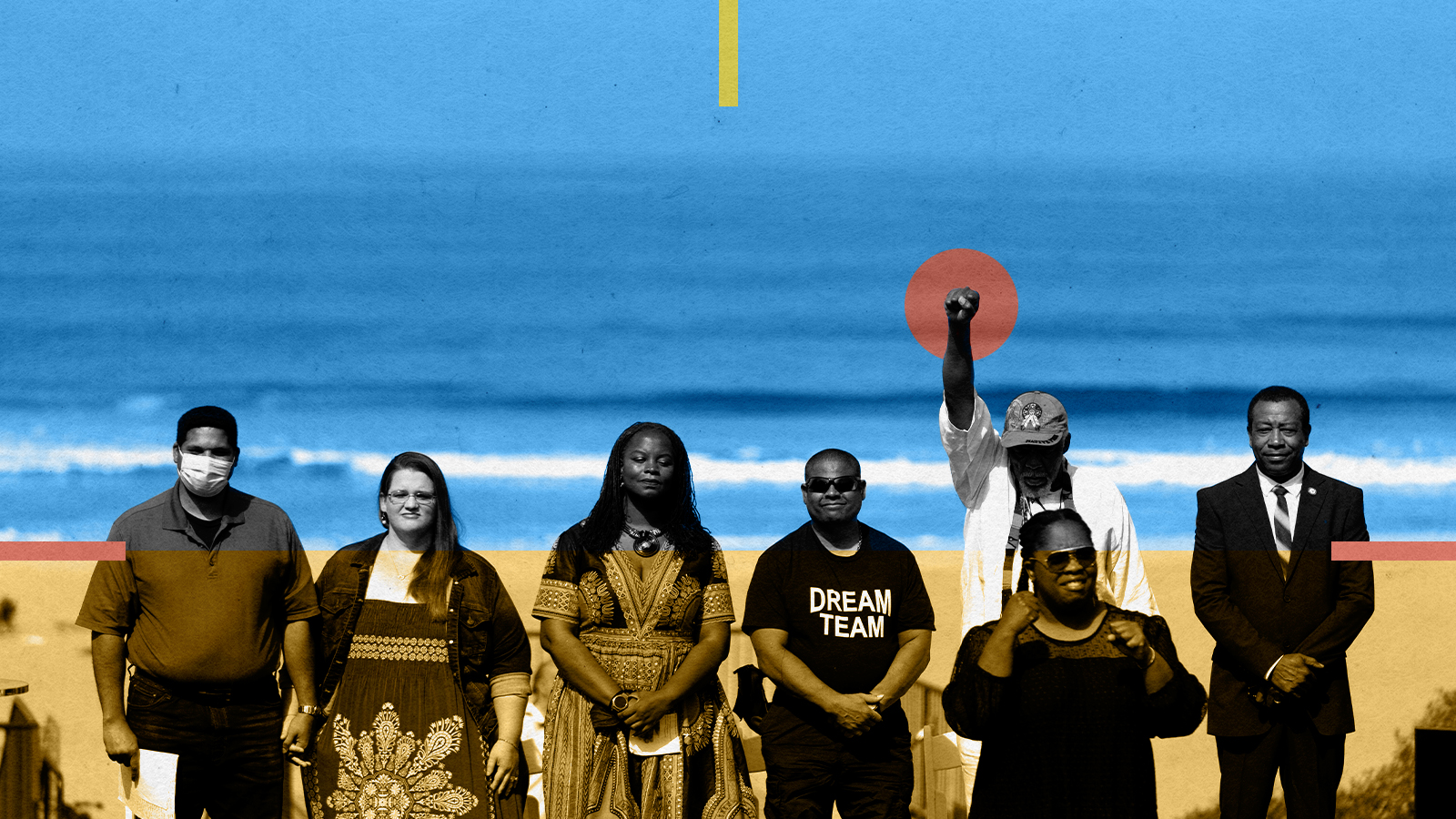The story behind Bruce's Beach
The Bruce family fought for years to get their beach back from Los Angeles County. Now they want to sell it.


A free daily email with the biggest news stories of the day – and the best features from TheWeek.com
You are now subscribed
Your newsletter sign-up was successful
It's been almost 100 years since the city of Manhattan Beach, an ocean-side community outside of Los Angeles, seized Bruce's Beach from the Black couple who owned it. Historical documents proved the act was perpetuated by racism, and last year the city returned the property to the couple's descendants. Recently, the family decided to sell the property back to Los Angeles County. Here's everything you need to know about Bruce's Beach:
What is the history of Bruce's Beach?
In 1912 and 1920, Willa Bruce bought land along the shore in the city of Manhattan Beach. Shortly after purchasing the lots, Willa and her husband Charles Bruce built a successful resort called Bruce's Lodge to accommodate Black families looking to enjoy seaside fun despite the looming shadows of Jim Crow laws and persistent racist harassment. More Black families began buying property nearby and the beach, which came to be colloquially known as Bruce's Beach, continued to thrive.
Unfortunately, local white landowners began to feel threatened by the community, suggesting that the growing Black population would affect the property value of Manhattan Beach. According to an April 2021 report prepared by a task force for the city, historical documents show that the "white neighbors resented the resort's growing popularity and prosperity of its African American owners." Within a week of building the resort, white landowners of "adjoining property" began harassing the Black guests that frequented the beach. Despite the racist harassment, the Bruce family remained undeterred.
The Week
Escape your echo chamber. Get the facts behind the news, plus analysis from multiple perspectives.

Sign up for The Week's Free Newsletters
From our morning news briefing to a weekly Good News Newsletter, get the best of The Week delivered directly to your inbox.
From our morning news briefing to a weekly Good News Newsletter, get the best of The Week delivered directly to your inbox.
"Wherever we have tried to buy land for a beach resort we have been refused," Willa told the Los Angeles Times in 1912 per the task force report, "but I own this land and I am going to keep it."
Ultimately, the local government stepped in to facilitate the end of the thriving seaside community. According to the bill that led to the property's eventual return, in 1924, the Manhattan Beach board of trustees voted to condemn Bruce's Beach and took control of it through eminent domain. The city officials offered the couple $14,500 and claimed they needed the land for a public park. The Bruces tried to challenge the city legally but ultimately lost the battle. In 1927, the family moved out of Bruce's Beach, and the city demolished the buildings two years later. The bill also notes that the city council voted to block any new resorts from opening to prevent the Bruces from relocating their business.
The city never followed up on plans to build the park they claimed to need, and the land remained undeveloped for over three decades before eventually being transferred to Los Angeles County. The lots now host a lifeguard training center.
How did the Bruces' descendants regain custody of the property?
Almost a century later, the descendants of Willa and Charles Bruce were still fighting for restitution for an act that haunted their family's legacy. "It's been a scar on the family, financially and emotionally," said Duane Yellow Feather Shepard, a relative and advocate for the Bruces, told The New York Times in 2021."What we want is restoration of our land to us," he said, "and restitution for the loss of revenues."
A free daily email with the biggest news stories of the day – and the best features from TheWeek.com
The family caught the attention of L.A. County officials after years of demanding justice for Bruce's Beach. Since the city could not provide monetary restitution with public funds, officials began considering how to restore the property to the original owner's descendants. However, because seizing the property resulted from government bureaucracy, turning the land over to the family was not simple. State law required that the county use Bruce's Beach for public recreation, and prevented it from transferring or selling the property.
What followed was a year-long process that included the creation of the aforementioned task force and the bill that would eliminate the restriction for Bruce's Beach. In September 2021, California Gov. Gavin Newsom (D) signed the bill, allowing the beach to be transferred back to the descendants. "I want to apologize to the Bruce family for the injustice that was done to them," Newsom said at the time, as reported by NBC Los Angeles. "We haven't always had a proud past."
A year later, the county returned the deed to the property to the couple's closest living heirs, their great-grandsons Derrick and Marcus Bruce. The process for returning the beach included a provision for L.A. County to lease the land from the family for $413,000 a year and an option to sell the property to the county for as much as $20 million.
After all that, why are the Bruces choosing to sell the beach back to the city?
On Jan. 3, Janice Hahn, the Los Angeles County Board of Supervisors chair, announced that the Bruces' great-grandsons decided to sell the property to the county for almost $20 million.
"I fought to return Bruce's Beach because I wanted to right this wrong. This fight has always been about what is best for the family, and they feel what is best for them is selling this property and finally rebuilding the generational wealth they were denied for nearly a century," Hahn said on Twitter. "This is what reparations look like and it is a model that I hope governments across the country will follow."
Liz Odendahl, a spokeswoman for Hahn's office, said the family notified the city of the sale on Dec. 30, and officials will likely finish the escrow process in 30 days, The New York Times reports.
Shepard said in a telephone interview with the Times that the Bruces are "very satisfied" with the sale price and wanted to sell the property because it is zoned for public use only. "They had no choice but to sell it and take whatever they could get out of it, and use it to invest in some other way to develop their family wealth that they've lost," said Shepard, a clan chief of the Pocasset Wampanoag Tribe of the Pokanoket Nation.
Not everyone was so thrilled. Kavon Ward, who founded a group called Justice for Bruce's Beach in June 2020 to support the family's fights for restitution, said in a statement that she did not believe the Bruce family's decision to sell the land would bring the family peace.
Ward, who is also a founder of Where Is My Land, a non-profit that seeks to help Black families reclaim stolen land, said, "While I am disappointed the Bruces have chosen to sell the land, I understand their decision as the city of Manhattan Beach is anti-Black."
Theara Coleman has worked as a staff writer at The Week since September 2022. She frequently writes about technology, education, literature and general news. She was previously a contributing writer and assistant editor at Honeysuckle Magazine, where she covered racial politics and cannabis industry news.
-
 Antonia Romeo and Whitehall’s women problem
Antonia Romeo and Whitehall’s women problemThe Explainer Before her appointment as cabinet secretary, commentators said hostile briefings and vetting concerns were evidence of ‘sexist, misogynistic culture’ in No. 10
-
 Local elections 2026: where are they and who is expected to win?
Local elections 2026: where are they and who is expected to win?The Explainer Labour is braced for heavy losses and U-turn on postponing some council elections hasn’t helped the party’s prospects
-
 6 of the world’s most accessible destinations
6 of the world’s most accessible destinationsThe Week Recommends Experience all of Berlin, Singapore and Sydney
-
 Code-switching: the origins, purpose and pitfalls
Code-switching: the origins, purpose and pitfallsThe Explainer Balancing your identity and respectability politics sometimes means taking on a different tone or behavior to fit in
-
 The video game franchises with the best lore
The video game franchises with the best loreThe Week Recommends The developers behind these games used their keen attention to detail and expert storytelling abilities to create entire universes
-
 The buzziest movies from the 2023 Venice Film Festival
The buzziest movies from the 2023 Venice Film FestivalSpeed Read Which would-be Oscar contenders got a boost?
-
 America's troubling school bus driver shortage
America's troubling school bus driver shortageSpeed Read Kids are heading back to school, but they might be having trouble getting a ride
-
 5 college admissions trends to watch out for this year
5 college admissions trends to watch out for this yearSpeed Read College advisers and admissions experts say these trends will shape the 2023-2024 admissions cycle
-
 What's going on with Fyre Festival II?
What's going on with Fyre Festival II?Speed Read Convicted felon Billy McFarland claims the music festival will happen, for real this time
-
 The answer to rising home prices: smaller homes
The answer to rising home prices: smaller homesSpeed Read Builders are opting for fewer rooms and more attached styles as frustrated homebuyers look for affordable options
-
 5 illuminating books about the video game industry
5 illuminating books about the video game industrySpeed Read Cozy up with a few reads that dig into some of the most fascinating parts of video game history
